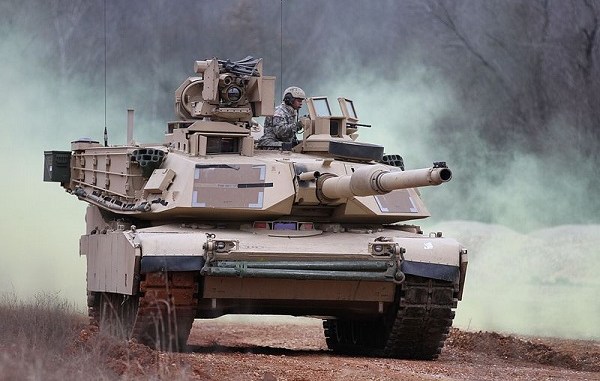
In the next several months, several NATO countries will be turning over main battle tanks to Ukraine. These tanks will be a tremendous help to Ukraine in resisting Russian offensives and in conducting their own offensive operations.
Background. Over the past year long and intense discussions have taken place among NATO allies behind the scenes and in the media over the issue of providing tanks to Ukraine. The country has requested more than 300 modern main battle tanks with which to resist the Russian invaders. The U.S. M1A2 Abrams tank is a superb choice; however maintenance and logistic issues are a big concern. The United States has, up to now, refused to send Abrams tanks to Ukraine. Many defense analysts believe the best solution would be the German Leopard 2; however, for a number of pragmatic and cultural reasons, Germany has resisted. Germany has insisted that the United States pitch in – supplying tanks as part of a broader effort.
U.S. Reverses Course. The United States announced on Wednesday, January 25, 2023, that it would provide 31 Abrams tanks. The Germans quickly followed with an announcement that it would provide 14 Leopard 2 A6 tanks. Germany also indicated that it would allow other nations to export their German-made Leopard tanks to Ukraine as well. The Germans were under immense diplomatic pressure to provide the tanks, but insisted on the U.S. doing the same. While President Biden has said that the U.S. decision to send tanks to Ukraine had nothing to do with the Germans demand for U.S. participation, there are skeptics who question his assertion.
Abrams Tanks. The DoD announced that the Abrams tanks are being procured via the Ukraine Security Assistance Initiative (USAI). The total package is $400 million and includes 31 Abrams tanks with 120mm rounds and other ammunition, eight M88 tactical vehicles to recover equipment, support vehicles and equipment, and funding for training, maintenance, and sustainment. This equipment is the equivalent of one Ukrainian tank battalion. The 68-ton tank has a 120-mm gun and can move about 72 kmh or 45 mph. The United States has 2,645 Abrams tanks of various modifications in service and 3,450 Abrams tanks in storage.

Photo: A German Army Leopard 2 tank, assigned to 104th Panzer Battalion, moves through the Joint Multinational Readiness Center during Saber Junction 2012 in Hohenfels, Germany, Oct. 25, 2012. Photo by Specialist Markus Rauchenberger, U.S. Army.
Leopard Tanks. A European consortium, including Germany and other nations, will be providing two battalions (80 tanks?) of Leopard tanks to Ukraine. Some of the other countries mentioned by the media that will provide the Leopards include Poland, The Netherlands, Norway, Spain, and Portugal. There are reports that up to twelve countries will provide their Leopard tanks. This 55-ton tank has a range of about 500 klics or 310 miles. It can get up to 68 kph or 42 mph. The main weapon is a 120-mm smooth bore gun with a fully-digital fire-control system. The inventory of Leopard 2 tanks of the European and NATO countries amount to around 2,400 tanks.
A Variety of Tanks. There are other tanks in the pipeline as well for Ukraine. The British are sending 14 Challenger 2 tanks projected to arrive in March 2023. A few other European countries have sent or plan to send Soviet-era T-72s. France may be sending their main battle tank as well.
Tank and Artillery Type of War. The Ukraine conflict has seen extensive use of tanks, armored vehicles, and artillery. The war has been the scene of the most use of tanks in battle in Europe since World War II. Up to now, both sides of the conflict have been using Soviet-era tanks. The countries of Poland and the Czech Republic have already donated hundreds of Soviet-era T-72 tanks to Ukraine. In addition, Ukraine has captured a substanitial number of Russian tanks on the battlefield.
Tank Training. The estimates vary on how long it would take to train the tank crews and maintenance personnel. Some reports say six weeks is the minimum for basic proficiency while others indicate it could take 3-4 months. Training for the tank crews and maintenance personnel for both the Abrams and Leopard could begin in weeks. It will likely take about two or three months for the Leopards to be fully operational in Ukraine; perhaps, a lot longer for the Abrams. Training is only one aspect of fielding the tanks in Ukraine; there are a host of issues with logistics and maintenance.
Additional Armored Vehicles for Ukraine. In mid-January, the United States announced a $2.5 billion assistance package that featured Bradley infantry fighting vehicles and Stryker armored personnel carriers. Germany is providing Marder infantry fighting vehicles, France AMX-10 light tanks, and Sweden is donating CV90 infantry fighting vehicles.
Turning Point? These tanks, if fielded in sufficient numbers with proper training, maintenance, and logistical support, could very well provide a big advantage to the Ukrainian forces. This advantage will factor into defending against Russian offensive operations or Ukrainian efforts to recover territory now occupied by the Russian forces. The current pledges for tanks by the NATO allies falls short of the Ukrainian request for 300 main battle tanks. But it is a start.
**********
References:
M1 Abrams – Wikipedia
https://en.wikipedia.org/wiki/M1_Abrams
Abrams Tank
https://www.national-security.info/ukraine/weapons/abrams-tank.html
Leopard 2 – Wikipedia
https://en.wikipedia.org/wiki/Leopard_2
German Leopard Tank
https://www.national-security.info/ukraine/weapons/leopard-tank.html
**********
Top Photo: An armored tank from 1st Battalion, 18th Infantry Regiment, 1st Infantry Division, heads into a simulated combat zone with concealment smoke billowing behind it during a combined arms breach exercise conducted at Fort Leonard Wood, Mo., Jan. 29. The tanks are from the Fort Riley, Kansas-based 1st Inf. Div., and provided ground support for the 4th MEB’s 5th Eng. Bn.-led training. (U.S. Army photo by Staff Sgt. Mark Patton)